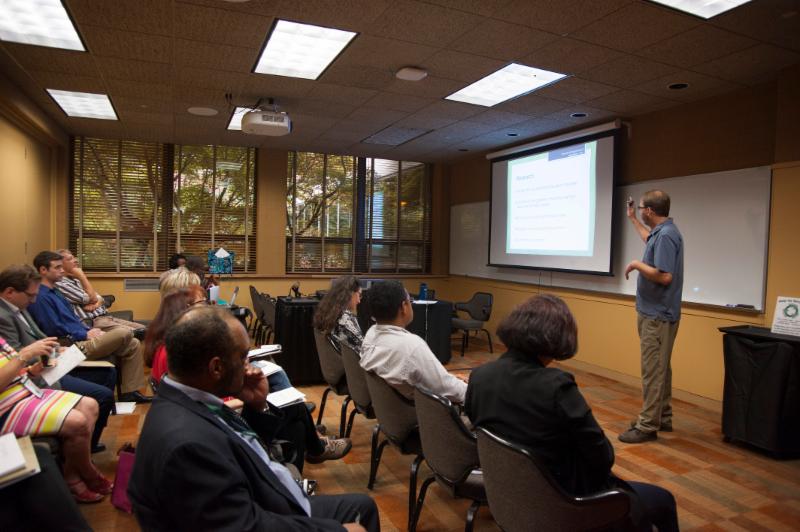Share, Learn, Create Innovative Economic Development Ideas!
"A diverse
and dynamic network developing innovative economic development ideas,
tools, models, policies, and practices for Michigan."
|
|
|
|
|
|
REI Receives Five More Years of Fundinig
|
The
Michigan State University Center for Community and Economic Development
has been awarded a $2.06 million University Center grant from the U.S.
Economic Development Administration to continue creating, identifying,
and implementing new and innovative economic development tools and
strategies in order to expand business opportunities and create jobs in
Michigan. Over the past five years, MSU REI has established many
beneficial partnerships with on and off campus partners and
stakeholders, many of whom have contributed to positive project outcomes
throughout the state.
Within the past five years, REI has
supported projects led by 15 different higher education institutions
throughout Michigan, and with over 800 individuals and organizations to
initiate over 100 projects, sparking more than $60,000,000 in additional
public and private investment. REI's nearly 50 webinars and videos, and
more than 65 in person in-person presentations at five Innovate
Michigan Summits have successfully disseminated new knowledge to the
state. All of this along with our network of over 1000 various industry
and academic professionals allowed REI to be recognized as a finalist in
the UEDA Awards of Excellence Program.
Going forward, MSU REI will introduce
the new "Innovation Fellow Program" to implement past projects with
interested community partners. We will also begin to expand REI's reach to the Midwest mega-region.
Click here for more information. |
Student-Led, Faculty Guided Projects
|
Call for Spring 2017 Student-Led, Faculty Guided Projects
REI is currently soliciting applications for 2017 Spring Semester Student-Led, Faculty Guided Projects!
These
projects leverage existing real-world initiatives to provide economic
development professionals with access to technical assistance and data
analysis that otherwise would not be available due to budgetary or time
constraints. Examples of projects have included assessments of regional
ports and community redevelopment plans. These projects do not
only provide valuable and inexpensive support to a community, they also
provide the students with experience in the field to be better prepared
for their future careers. Project reports can be found on REI's current projects page. The deadline to apply is November 18th, 2016, and the application can be found here. |
 |
 Introducing: The MSU REI Innovation Fellow Program
To kick off
our new round of funding from UEDA, REI is rolling out a new project
phase this winter: the Innovation Fellow program. Innovation Fellows
will be community leaders who will facilitate the implementation of past
Co-Learning Plans. We will begin soliciting for innovation fellows on
December 7th, but its not too early to start planning. If you are a
community organization who would like to implement a version of one of
our past Co-Learning plans or Student-Led Faculty Guided Projects, this
is your opportunity!
For more information, please reach out to REI Project Coordinator Jennifer Bruen (bruenjen@msu.edu).
|
 |
What is a Co-Learning Plan?
Co-Learning
is a process in which multiple parties collaborate to generate new
knowledge. In a Co-Learning Project, innovative economic development
tools, models, strategies, policies, and practices are researched, and
the findings and recommendations serve as a key resource for economic
development practitioners and policymakers in Michigan. Co-Learning
Plans can be written by practitioners, decision-makers, community
leaders, entrepreneurs, scholars, or other stakeholders.
Learn more about the process here.
|
 |
Potential Project Ideas for 2016-2017
Below is a
list of potential topic ideas for our next round of projects! We will
begin soliciting applications for authors later this month; stay tuned!
- Term Limits and Economic Development
-
Term limits on Michigan's
legislators were initiated in 1992, this report would analyze and
compare how long-term goals were affected by this after 1992. Also, it
would compare economic development strategies between states with and
without these term limits.
- Social Entrepreneurship
- Public Infrastructure and Economic Development
-
Should public dollars be spent to attract a business when excess capacity exists in other communities?
-
This project would research
what has been done in other places in the US to strategically target
publicly funded infrastructure, and target models that could be adopted.
- Gender Gap
- Job Sharing and Succession
- Dashboard Denial
- Riba Free Financing
-
Areas with large Muslim
populations are religiously motivated to avoid interest bearing loans,
which makes it much harder for them to get a business off the ground.
-
There is a successful crowd
funding market in Minneapolis that allows business owners and
entrepreneurs access to capital while maintaining Sharia compliance.
-
The project would examine the potential of alternative funding programs in Michigan and create a plan for implementation.
- Great Lakes Non-Compete Agreements
-
Tax incentive based competition between states is causing an unstable, ever relocating business flow.
-
Would analyze the ways that non-compete agreements affect the economic climate in the Midwest compared to other regions.
- Cultural Food and Tourism
-
This project would examine
pre-colonial diets that emphasize sustainability, healthfulness, and
appropriateness tied to cultural heritage tourism.
-
Would study successful projects in other regions and assess the potential in Michigan.
- Unconditional Basic Income
-
Unconditional Basic Income
mandates a guaranteed stipend to every resident of a community in
efforts to address rising inequality.
-
This is gaining popularity
among other prosperous regions in the world, what is the feasibility for
implementation in Michigan and other states?
|
 |
 |
|
|
|